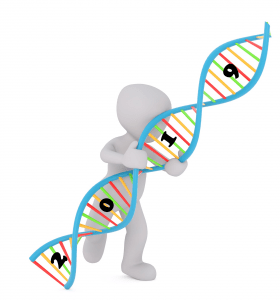
As 2019 comes to a close and I reach the year anniversary of completing my dissertation research on the topic, it felt appropriate to do a mini year in review for third-party genetic interpretation tools. There’s been a whirlwind of activity in this area, perhaps no surprise due to the of entanglement of third-party tools with two other rapidly evolving areas: direct-to-consumer (DTC) genetic testing and human genetic research. In some ways, this past year has seen a further blurring of boundaries between these areas—fascinating and challenging for those of us studying this topic. And in fact, the three events I’ll highlight below are all from just the last quarter of this year, further evidence of how fast the times are a-changin’.
SNPedia and Promethease acquired by MyHeritage
In early September, the third-party interpretation tool Promethease, and its underlying annotation database SNPedia, were acquired by the DTC testing company MyHeritage. Not surprisingly, this acquisition came a few months after the company announced it was broadening its services to include health reports, an expansion from the previous focus on genealogy and ancestry.
According to my study of third-party tool users, Promethease has been the most popular tool for returning health-related information, including reports on thousands of disease and conditions that are powered by the crowd-sourced (or “community-curated”) SNPedia. These are also the oldest third-party tools (“oldest” being a relative term, of course) with SNPedia and Promethease launching in 2006 and 2008, respectively. Exactly how these will be integrated into MyHeritage is not yet clear, but it sounds like the company plans to leverage the variant annotations from SNPedia in their new health reports and keep Promethease as a companion tool that still accepts uploads from other DTC companies, for a modest fee.
GenePlaza launches, and takes down, its “How Gay Are You?” app
In October, there was deserved controversy when the third-party tool GenePlaza began offering a “How Gay Are You?” test, based on a genome-wide association study (GWAS) of same-sex sexual behavior published in August. Even prior to this commercialization, that GWAS provoked much discussion within the genetics community, including how scientists should consider the ethical and social implications of their work. The Broad Institute, the home institution of the primary authors, published a summary and links to perspectives written by different Broad scientists – one of my favorites being the compelling argument that “the potential harms of a study on same-sex sexual behavior outweigh any possible benefits.”
So against that fraught backdrop, barely a month after the GWAS was published, a menu offering pops up on GenePlaza using the findings from the study (odd, since it found you could not actually predict same-sex sexual behavior from genetics). Notably, the authors were not connected to the GenePlaza app and openly objected to it as a misuse and misrepresentation of their research. A few weeks later, the app was taken down following a petition signed by over 1K scientists calling for its removal.
While there are many fascinating and disturbing elements to this story, to me one of the most interesting is how it exemplifies the way that the machinery and output of “traditional” human genetics research can be re-purposed and retooled in the consumer space. I saw this with other third-party tools that use publicly available literature (e.g., PubMed) and variant annotation (e.g., ClinVar and dbSNP) databases to fuel their interpretations. The scientific community, whether compelled by funders and/or a sense of civic duty, has pushed to make findings and resources publicly available. Inevitably these knowledge substrates have and continue to get picked up by entrepreneurs and citizen scientists, sometimes in ways that are ethically and/or scientifically questionable.
GEDmatch meets its match
The genealogy site GEDmatch was the little boat cast into a large, tempestuous sea when its database of ~1M users was used by law enforcement to apprehend a suspect in the Golden State Killer case in spring 2018. Since then, over 50 rape and murder cold cases have been solved using investigative genetic genealogy (IGG) supported largely by GEDmatch. A small outfit run by a genealogy hobbyist/retiree, Curtis Rogers, GEDmatch was undoubtedly overwhelmed by the public attention and likely conflicting views of its genealogy user base. In May of this year, GEDmatch changed its terms of service to require customers to explicitly opt in to uses by law enforcement, drastically reducing the search space for these investigations. This fall, computer scientists from the University of Washington demonstrated some rather damning privacy and security flaws in GEDmatch, which they notified the site of prior to publication but apparently to little effect. In November, the first successful search warrant of the GEDmatch database was issued by a judge in Florida, which would allow a search of profiles regardless of the opt-in status.
It appears to all have caught up with Rogers, because just last week GEDmatch was acquired by a forensic sequencing firm, Verogen. It’s unclear exactly what GEDmatch will look like going forward, though Verogen has stated plans to continue offering genealogy services for users while at the same time selling access to the opted-in portion of the database for IGG purposes.
Looking ahead
It’s foolish to make strong predictions for third-party tools in 2020, especially given the crazy ride that was 2019. But here are some trends I’m keeping an eye on:
- How the intensification of research on polygenic risk scores will be taken up in the consumer and citizen science spaces
- Further distancing of some DTC companies from third-party tools in light of controversial apps such as GenePlaza’s (i.e., when 23andMe constrained how its API could be used by third-party tool developers)
- Perhaps further embracing (to the point of acquisition?) by DTC companies of third-party tools (e.g., as MyHeritage has done for Promethease)
- Enhanced security measures by DTC companies to prevent spoofing of files uploaded to third-party sites (i.e. will 2020 be the year cryptographic signatures go from research paper to commercial adoption?)